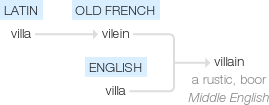Villain
Middle English (in the sense ‘a rustic, boor’): from Old French vilein, based on Latin villa (see villa).
wiktionary
Probably from Middle English villein, from Old French vilein (modern French vilain), in turn from Late Latin villanus, meaning serf or peasant, someone who is bound to the soil of a Latin villa, which is to say, worked on the equivalent of a plantation in late Antiquity, in Italy or Gaul. Doublet of villein.
etymonline
villain (n.)
c. 1300 (late 12c. as a surname), "base or low-born rustic," from Anglo-French and Old French vilain "peasant, farmer, commoner, churl, yokel" (12c.), from Medieval Latin villanus "farmhand," from Latin villa "country house, farm" (from PIE root *weik- (1) "clan"). Meaning "character in a novel, play, etc. whose evil motives or actions help drive the plot" is from 1822.
The most important phases of the sense development of this word may be summed up as follows: 'inhabitant of a farm; peasant; churl, boor; clown; miser; knave, scoundrel.' Today both Fr. vilain and Eng. villain are used only in a pejorative sense. [Klein]
